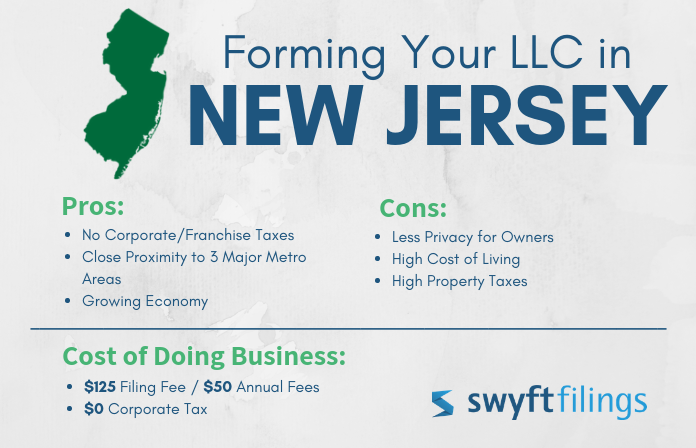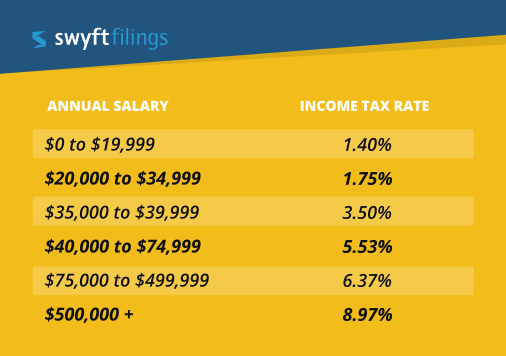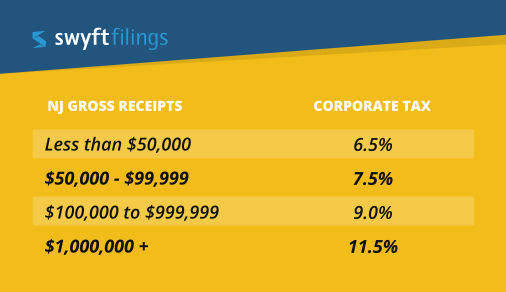State Guides
Guide to Forming an LLC in New Jersey

Follow our free guide to form an LLC in New Jersey
- Pros and Cons of Forming an LLC in New Jersey
- Starting Your New Jersey LLC
- Maintaining Your New Jersey LLC
- Additional New Jersey Resources
Check out our informative guide on building an LLC in New Jersey and learn everything you need to know about forming your LLC business.
Pros and Cons of Forming an LLC in New Jersey

Pros
No Corporate/Franchise Taxes
The state of New Jersey does not impose any corporate or state tax on LLCs. The only taxes owed on the LLC’s revenue is the personal income tax paid by the members.
Close Proximity to Three Major Metro Areas
New Jersey is located in a prime geographic area and is in relatively close proximity to three major metropolitan areas: New York/Newark/Jersey City, Philadelphia/Camden/Wilmington, and Washington/Arlington/Alexandria. All three zones are among the top metro areas in the nation.
Growing Economy
New Jersey knows how to make money - despite its small size, the state’s GDP is almost $600 million ($592 million in 2017) In fact, New Jersey had the 8th highest GDP in the nation in 2017, surpassing many states twice its size.
Cons
Less Privacy for Owners
New Jersey is among the states that require full disclosure of an LLC’s members in the incorporation paperwork.
High Cost of Living
New Jersey’s soaring cost of living easily puts it at the top of the list for most expensive states in the country. The average home price is well over $500,000 and 2016 saw a hike on gasoline tax of almost 25%. New Jersey residents typically spend almost 15% more for common necessities than residents in other states.
High Property Taxes
As expensive as it is to live in New Jersey, high property taxes only add to the financial burden. The average property tax rate is more than double the national rate: 2.40% over 1.20%. The average bill for property taxes in New Jersey is not far from $10,000 — $8,350 in 2015.
Cost of Doing Business
- $125 Filing Fee/$50 Annual Report
- $0 Corporate Tax
Phase One: Starting Your New Jersey LLC
Even though forming an LLC seems like a daunting task, the process is much easier than you might think, especially if you have professional assistance like Swyft FIlings. Here are the steps needed to ensure that your New Jersey LLC comes together correctly:
- Step 1: Name your LLC
- Step 2: Establish Ownership of your LLC
- Step 3: Select a Registered Agent
- Step 4: File the Certificate of Formation (Register Business)
- Step 5: Create your Operating Agreement
- Step 6: Obtain an EIN
Step 1: Name Your New Jersey LLC
The first step in forming your New Jersey LLC is to choose a name your business. Keep in mind that some state and federal regulations and restrictions exist regarding the use of certain words in business names.
Tip: Use a free business name search tool to ensure your company’s desired name is available.
Business Name Guidelines
- The official name of your business must end with: Limited Liability Company, Limited Company, LLC, or L.L.C.
- Your business name cannot be intentionally misleading to consumers
- The name of your new LLC must not be similar to another organization’s name/trademark
Restrictions
- “Lottery” and “Bank” are ineligible for use (any state)
- Terms that represent educational or Veterans’ organizations are restricted
- Terms related to the Armed Forces or civil servants (police, EMT, fire)
LLC business names associated with government and/or financial entities are not always restricted - it depends on the state. Additional paperwork may be required.
URL Availability
You will also need to select a domain name for your LLC’s website. Even if you are not doing business on the internet, you still need to maintain an online presence. You can check domain name availability through web hosting sites.
Step 2: Establish Ownership
The owners of an LLC are referred to as members and managers. All LLCs will have members, but not every LLC will have managers — the difference depends on the management structure of the business.
LLC Management Structures:
- Member-managed: All members participate in operating and making decisions for the LLC
- Manager-managed: An appointed manager oversees the daily operations of the LLC and the members are not actively involved.
New Jersey LLC Member Guidelines
Required Number of Members
There must be at least one member or manager to form an LLC in New Jersey.
Member Disclosure Requirements
The state of New Jersey requires that at least one member/manager be listed in the filing paperwork.
Age Restrictions
LLC members in New Jersey may be of any age.
Residence Restrictions
There are no residency restrictions imposed on LLC members in New Jersey.
Step 3: Find a Registered Agent in New Jersey
The registered agent is necessary for all LLCs formed in New Jersey. You must have this position for your business to be official.
What is a registered agent?
A registered agent is a person or business who can accept official government and service of process notices for the LLC.
Why do you need a registered agent?
The state of New Jersey requires you to appoint a registered agent so that the Secretary of State and the courts have a consistent way to contact your LLC.
What are the main requirements for a registered agent?
- The registered agent must have a physical address — not a P.O. Box
- The registered agent must be available during business hours
Who can be a registered agent in New Jersey?
- A state resident with a physical address in New Jersey
- An LLC or corporation that is licensed to conduct business in New Jersey
Is the registered agent’s contact information publicly accessible?
The name and contact information of the LLC’s registered agent is a matter of public record.
Can I be my own registered agent for my business?
You are legally allowed to be your own registered agent as long as you have a physical address in New Jersey.
Is being my own registered agent discouraged?
Since the registered agent’s name and address are publicly listed, LLC business owners who choose to be their own registered agent risk compromising their personal information.
Tip: Avoid the hassles and choose Swyft Filings to fill the registered agent needs for small businesses in New Jersey. Find more information here.
Step 4: File the Certificate of Formation/Public Business Filing Form
In order to legally and officially form an LLC in New Jersey, one of the most important steps is to officially register your business with the Secretary of State.
What is the Certificate of Formation?
The Certificate of Formation is a legally binding document that is filed with the state government to officially and legally form your LLC.
Why do I need the Certificate of Formation?
Your New Jersey LLC must file the Certificate of Formation in order to be legally recognized by the Secretary of State. Consider this document as part of your LLC’s foundation.
What information is included in the Certificate of Formation?
- The name of the LLC
- The location of the business
- The name and location of the registered agent
- The description of the LLC as either member-managed or manager-managed
- The name of at least one member/manager of the LLC
- The statement of purpose
Additional New Jersey Filing Information - Professional LLCs
New Jersey allows some professional service businesses to form LLCs; although usually known as a Professional Limited Liability Company (PLLC), state law does not distinguish between a PLLC and an LLC.
The following professions generally form a professional LLC:
- Accountants
- Attorneys
- Physicians/Medical Professionals
- Professional Counselors and Psychologists
- Architects and Engineers
- Veterinarians
- Social Workers
A few points to consider:
- All members of the LLC must be licensed in the profession of the business.
- The LLC is only allowed to provide services for which the business was formed.
- The members are still subject to whichever licensing boards govern the LLC’s profession.
Step 5: Create an LLC Operating Agreement
When you form an LLC in New Jersey, it is good practice to create an LLC Operating Agreement to structure, protect assets, and demonstrate professionalism.
What is an LLC Operating Agreement?
The LLC Operating Agreement is a legal document that defines the rights and responsibilities of each person involved in the business and laying out the details involving how the business will operate.
Why do I need an LLC Operating Agreement?
Because the LLC Operating Agreement defines the roles of the business’s members and provides direction for daily operations, the document ensures stability and structure to the LLC and reduces future disputes.
Do I need to file the LLC Operating Agreement?
You do not need to file the Operating Agreement with the state; it is for the benefit of your LLC and remains in-house.
What goes into an LLC Operating Agreement?
While there is not a set rule of what must be included in your LLC operating Agreement, most documents include the following the information:
- Initial capital contributions of the members
- Who gets to vote, how they vote and what percentage of votes are needed to do certain actions
- Restrictions on transfer of a member’s share or the addition of a new member
- How profits will be distributed
- Designation of members/managers
Tip: Get a customized LLC Operating Agreement for your small business with Swyft Filings. Find more information here.
Step 6: Obtain an EIN
New Jersey requires an EIN (Employer Identification Number) for all LLCs that will have employees, and most banks will require one to open accounts.
What is an EIN?
The EIN (Employer Identification Number), sometimes referred to as a Federal Tax ID, is a nine-digit number assigned to your business by the Internal Revenue Service (IRS) that identifies your business with the government. Many people compare the EIN to a personal social security number, except it is used specifically for business reasons.
What entities need an EIN?
If you are operating any type of entity other than a sole proprietorship, you will likely need an EIN to conduct business. The more common reasons you would need an EIN are:
- To hire employees
- To open a bank account in the U.S.
- To file your company’s taxes
- To pay independent contractors
If you collect revenue of any kind through a corporate entity, you will need an EIN.
Swyft Filings offers EIN services for small businesses in New Jersey. Find more information here.
Phase Two: Maintaining Your New Jersey LLC
The initial phase of setting up your New Jersey LLC is completed, but there are a few more steps to go through that will focus on getting your business ready to actually conduct business. The next few steps include:
- Step 1: Register for the necessary taxes in New Jersey
- Step 2: Apply for the required permits and licenses
- Step 3: File a Certificate of Good Standing
- Step 4: File the Annual Report for your LLC
Step 1: Register for New Jersey State Taxes
New Jersey is among the few states in the country that does not charge LLCs any corporate or franchise taxes. LLC members are still required to pay state and federal income taxes on their earnings.
Please Note: For any LLC in New Jersey that opts to be taxed as a partnership, each member of the business must pay the state’s $150 Partnership Tax.
State Income Taxes
The state income tax rate for New Jersey is one a tiered scale — see below:

Corporate Tax Information
You can also choose to have your LLC taxed as a corporation; if so, you will be responsible for paying the corporate income tax rate on your business’s earnings. Corporations in New Jersey must pay a gross receipts corporate income tax — see chart below:

Additional Tax Information
Other taxes your LLC may need to pay:
- Sales and Use Tax at 6.625%
- Employee Withholding Tax
- Unemployment Tax
Step 2: Obtain Business Licenses and Permits
The licenses and permits required for an LLC in New Jersey can vary, depending on a number of variables:
- Location (city and county)
- Type of Business
- Industry
Tip: If you would like to see more in-depth information on licenses and permits, please feel free to visit the content in our learning library that covers business licenses and permits.
Step 3: File an Annual Report
All businesses formed in New Jersey are required to file an annual report with the Secretary of State.
What is an annual report?
An annual report, which is also called a periodic report, is a legal form that is filed with the Secretary of State on a periodic basis that is designed to keep your business’s information current with the state.
What kind of information is in the annual report?
The information requested in the annual report is similar to what was listed in the Certificate of Formation:
- The name and address of the business
- The name and address of the registered agent
- The names of the members
- The business’s EIN
Is the annual report part of public record?
The annual report filed on behalf of your LLC is a matter of public record.
Fees and Due Date
Fee: $50/ additional $25 for changes
Due Date: The anniversary month of LLC formation
Implications of Late Filings: Your LLC will be dissolved after 2 years delinquency
Swyft Filings helps you stay compliant by providing stress-free solutions. File your annual report with us today.
Step 4: Obtain a Standing Certificate
Your New Jersey LLC is almost ready for business — your last step is requesting a Certificate of Good Standing for your business.
What is a Certificate of Good Standing?
The Certificate of Good Standing is a state-level notification that confirms your business is properly formed and is in compliance with all state regulations.
Who issues the Certificate of Good Standing?
The Certificate of Good Standing is generally issued by the Secretary of State.
When can I request a Certificate of Good Standing for my business?
You can obtain a Certificate of Good Standing once your LLC is officially formed through the Secretary of State.
Why do I need a Certificate of Good Standing?
Many businesses and financial institutions prefer proof that your LLC is in good standing with the state before continuing with any business dealings.
Additionally, some states require a Certificate of Good Standing before a business can apply for Foreign Qualification.
Does the Certificate of Good Standing have an expiration date?
The Certificate of Good Standing does not expire/does not need to be renewed.
Swyft Filings can create a Certificate of Good Standing for your New Jersey LLC. Click here for more information.
